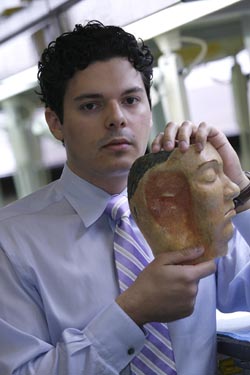Dental student designs possible treatment for facial and breast reconstruction
 Photo by Ryan Brandenberg/Temple University
Michael Stosich, third-year dental student, holds a model used to build facial prostheses.
|
Someday, patients disfigured by cancer, birth defects or trauma could benefit from the research of Michael Stosich, a third-year student at the Maurice H. Kornberg School of Dentistry at Temple University. In a paper published in the September issue of the journal Tissue Engineering, Stosich and Jeremy Mao, associate professor of orthodontics at Columbia University, found promise in a technique that would use a patient’s own stem cells to regrow soft tissue damaged by facial tumors, breast cancer, injury or a congenital abnormality, such as cleft lip and palate.
This tissue engineering technique would be preferable to current options, which include prostheses and numerous surgeries, because it makes for a more natural appearance. Up to 70 percent of the soft tissue grafts currently used in plastic and reconstructive surgery can’t hold the original contour and get absorbed by the body. |
|
“Our approach is unique in that a tissue graft, created using stem cells, feels like natural soft tissue, does not lose shape and forms new blood vessels,” Stosich said. Because the tissue that he and Mao have engineered also resembles the structure of breast tissue, it could someday be used for breast reconstruction as well.
|
|